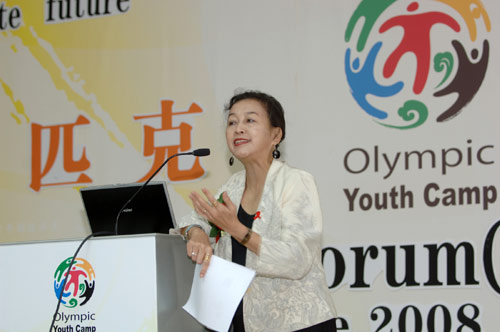Young people can help promote gender equality and create a better, more equal world for girls to help girls to achieve their full potential, UNICEF China appealed yesterday to the more than 480 youth representatives of National Olympic Committees from 205 countries and regions participating in the Beijing Olympic Youth Camp at Beijing 101 Middle School.
The theme of the 2008 Olympic Youth Camp is "Youth Create Future," emphasizing the power of youth to create a better world. Dr. Yin Yin Nwe, UNICEF Representative to China, invited the youth representatives to share their ideas on how to address gender inequality.
|

|
|
UNICEF Representative to China, Dr Yin Yin Nwe, addresses international youth representatives at the Olympic Youth Camp, Beijing. Copyright: James Zeng Huang/UNICEF China
|
"In 1989, a UNICEF staff member working in a South Asian country took this photo of a mother and her twin babies. The mother only breastfed the boy, because she didn't think she had enough milk for both of them. The girl died shortly after the photo was taken." Dr. Nwe said, showing the youth audience a photograph to illustrate that gender inequality often begins at birth.
Gender inequality persists into childhood and adulthood. When girls grow up, they are more likely than boys to be malnourished, denied access to education, and denied fair employment opportunities. Women work longer hours than men, but earn on average 20% less. There are much fewer women leaders in government decision-making bodies. And also with the HIV pandemic, there is increasingly a higher prevalence amongst women in some countries.
"Education can reduce mother and child mortality, and can empower women to combat HIV/AIDS. So why are girls not given the same access to education as boys?" Dr. Nwe put the question to leaders of tomorrow.
"Because girls have to go stay at home to help their mothers," replied Shirleen Mazur, an Olympic Youth Camp participant from Bangladesh. "Then why don't boys have to help their mothers?" Dr. Nwe asked. "Because people think women have to do the housework at home - because of people's attitudes," Shirleen responded.
Shirleen shared her thoughts about gender inequality in her country. "In some rural areas of Bangladesh, girls can't go alone on streets because they will probably be abused by men. Girls have to do house chores at home and can't go to school," she said. "When I go back to my home country, I will definitely help change people's attitudes, especially parents'."
"Civil societies, governments, and lawmakers have to work together to change people's attitudes, create equal access to education, and protect women from violence and abuse." Dr. Nwe said. "I hope we won't have to wait that long, but when some of you become lawmakers in the future I hope you will work to promote gender equality."
UNICEF HIV/AIDS Programme Chief Ken Legins talked with some of the youth representatives during the session break.